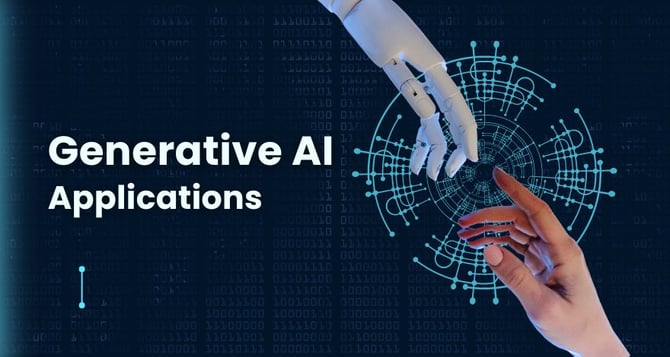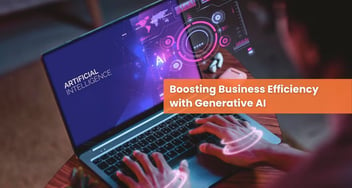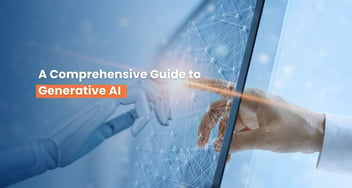Applications of Generative AI in Various Industries
From software engineering to marketing, Generative AI can be used to create new data, such as images, text, and music, to accelerate sales and productivity. It is being used in a variety of industries to improve efficiency, create new products and services, and personalize experiences. Learn how it works for your business.

The blank screen stares back at you, taunting you to write the perfect headline. Your fingers hover over the keyboard, but you're stuck. What could be the ideal way to grab your reader's attention? Or, your mind is still racing with possibilities, and the deadline is fast approaching.
And, suddenly, you remember the power of Generative AI. This technology can create anything from scratch, like images, text, and music, to discover new molecules with just some mere clicks.
“Generative AI is a period of generational change in Artificial Intelligence”
Heretofore, machines have never been able to show indistinguishable behaviour from humans. Thankfully, Generative AI models don't confine themselves to carrying sophisticated conversations with users; they also generate seemingly original content.
So, why wait?
Let's uncover the exciting world of Generative AI and explore how this technology is re-engineering the conventional business process to the way we create and eat content. But first, let's understand the buzzword to the roots - "Generative AI".
What is Generative AI?
Generative AI is a type of Artificial Intelligence designed to create new data instead of analyzing and classifying the data humans produce.
Generative AI is a powerful tool with the potential to change the way we interact in the world around us.
The example of content that is generated sheaths but is not limited to merely text, code, audio, video, and visuals; there’s a lot more under the umbrella of Generative AI.
Generative AI models are primarily trained on large datasets (billions and trillions of parameters) depending upon ML principles. As a result, Generative AI models designed to identify the pattern and data structures make the most of the pre-trained knowledge to create new data from scratch.
The breakthrough of ChatGPT and DALL-E, which reached a whopping 100M users in just two months after the roll-out, has shown exceptional interest in Generative models. Additionally, ChatGPT development continues to captivate the tech community, highlighting the ongoing advancements in the field of conversational AI.
What’s next?
OpenAI has done everything it can to keep the complete community on its toes. Regardless of futile attempts by many other industry giants to steal OpenAI’s thunder, it’s constantly bringing innovation, curating its position as the forerunner advocate for AI research. Furthermore, OpenAI's groundbreaking technologies have led to numerous OpenAI use cases for business, demonstrating its commitment to driving practical applications of artificial intelligence in the corporate world.
Notably, under the right circumstances, the interest in Generative AI can be transformed into business-specific use cases for your business.
With Generative AI, computers can suggest the most relevant patterns to input, allowing them to provide the corresponding content. Although to make the most out of generative AI, human involvement is inescapable, and that is at the initiation as well as completion stage of the training.
Why Should You Consider Generative AI for Your Business?
While the subject matter is at its peak in popularity, businesses often find it daunting to leverage the most value from it. Let’s shed light on the enterprise insights that vividly portray how Generative AI use cases have revolutionized the industry.
- A report by Salesforce portrays that 57% of IT leaders believe that AI is a game-changer.
- Using Generative AI in a few functions can bring most of the technology impact across potential corporate use cases.
- According to Gartner, revenue growth (26%) and cost optimization (17%) are the primary purpose of Generative AI investments among business executives.
- According to a McKinsey study, 75% of all the value that Generative AI delivers circumscribe under the umbrella of customer operations, software engineering, R&D, and marketing and sales.
- Generative AI enables an annual labor productivity growth of 0.1% to 0.6% by 2040.
These insights, when amalgamated with the renewed interest, encourage businesses to navigate new ways to make the most of this technology. And, if you are sitting at the edge wondering what Generative AI has for you, let’s find out.
Generative AI = The Next Productivity Frontier
Applications of Generative AI - Where Business Value Lies
While Generative AI is an amazing and advancing technology, it has the potential to open completely new frontiers in creativity as well as innovation. Not to mention again, generative AI has already expanded the possibilities of what overall AI can achieve.
Herein, we highlight the potential value of Generative AI across distinctive industries.
- Customer Operations
- Marketing and Sales
- Software Engineering
- Product Research & Development
Customer Operations
Generative AI can transform customer operations wholly, enhancing the customer experience and employee productivity through digital self-service while improving and augmenting their skills.
Beyond shadows of doubt, Generative AI has cemented its footsteps in customer service because of its potential to automate interactions with customers using natural language.
- The research found that the application of Generative AI increases issue resolution by 14%/hour and reduces the time spent on managing a concern by 9%.
- It also minimized agent attrition and requests to speak to a managerial position by a whopping 25%.
The following are some unskippable examples of the operational improvements Generative AI has:
-
Customer Self-service
Generative AI-integrated chatbots provide immediate and customized responses to complicated customer inquiries despite the customer's language or location.
So, by improving the quality and effectiveness of interactions through automated channels, Generative AI could automate responses to a bigger percentage of customer inquiries, allowing executives to address only those inquiries that a human agent can resolve. To your surprise, half of the customer contacts made by banking, utilities and telecommunication companies in North America are already managed by machines, including but not exclusively AI.
-
Resolution During The Starting Time
Generative AI can quickly extract specific customer data of the company, which further helps human customer service representatives answer queries successfully and resolve concerns during the initiation stage.
-
Sales Scaled
Because of the Generative AI capability to quickly process data on customers and their browsing histories, it becomes a lot easier to find product suggestions and deals customized to user's preferences. In addition, Generative AI can improve quality assurance and coaching by collecting insights from customer conversations and analyzing what could be improved; it also enables mentorship programs to provide tailored guidance and support to employees.
All in all, establishing Generative AI in customer care functions increases productivity at a value varying from 30% to 45% of the present costs.
Marketing and Sales
“Enhancing Customization, Sales Productivity & Content Creation”
There’s no doubt that generative AI has the lion’s share in marketing and sales functions, especially among which text-based communication and personalization are driving forces.
The technology has the potential to craft customized messages personalized to individual customer interests, preferences, and behaviors. Moreover, they do tasks like producing first drafts of brand advertising, slogans, headlines, social media posts, and product descriptions.
-
Marketing
Welcoming Generative AI in marketing functions needs careful consideration. Wondering why?
Mathematical models trained on publicly available data without sufficient protection against copyright violations, plagiarism, and branding recognition risk chaos on intellectual property rights. A virtual try-on application often produces a differentiated representation of specific demographics due to biased training data.
Therefore, significant human assistance is inescapable for conceptual and strategic thinking catering to a company's unique needs. Here's a handful of operational benefits Generative AI offers for marketing:
-
Effective and Seamless Content Creation
Generative AI has the potential to reduce the time needed for ideation and content creation significantly, saving valuable effort and time. Also, it can facilitate consistency across different content pieces, ensuring the same brand voice throughout, writing style, and format.
Plus, team members can easily collaborate through Generative AI, which integrates all ideas in one cohesive piece. This way, teams can enhance the personalization of marketing messages catering to different segments, demographics and geographies. Even mass email campaigns can be quickly translated into as many languages as needed, based on audience.
|
💡 Generative AI’s potential to generate content with distinctive specifications increases customer value, attraction, conversion and retention over a lifetime compared to present traditional techniques. |
Improved Use of Data
Generative AI helps marketing functions resolve the demurs of inconsistent, unstructured, and disconnected data, like interpreting abstract data sources such as images, texts, and different structures. Plus, it helps marketers make better use of data for synthesized customer feedback, territory performance, and customer behavior to create data-informed marketing strategies like targeted customer profiles and channel suggestions.
These kinds of tools could easily create trends and identify key drivers of market and product opportunities from unstructured data like news, customer feedback, social media, etc.
-
SEO Optimization
Generative AI can help marketers achieve higher conversion and lower costs through search engine optimization (SEO) for marketing and sales technical components such as page titles, image tags, and URLs. It can synthesize key SEO tokens, support specialists in SEO digital content creation, and distribute targeted content to customers.
-
Product Discovery and Search Customization
Using Generative AI, product discovery and search can be customized with multimodal inputs from text, speech, and images, along with a deep understanding of customer profiles. For instance, Generative AI leverages individual user preferences, behavior, and purchase history to help clients identify the most relevant products and generate customized product descriptions.
This enables CPG (Consumer Packaged Goods), travel, and retail companies to scale their e-commerce sales by accomplishing higher website conversion rates. It’s estimated that Generative AI manifolds the productivity of the marketing function with a value varying between 5 and 15% of the complete marketing spending.
Sales
Without a doubt, Generative AI can change the way both B2C and B2B companies do sales. Following are two use cases for better understanding:
-
Improved Lead Development
Generative AI helps sales representatives nurture leads by creating relevant product sales information and customer profiles, creating discussion scripts to initiate customer interactions, and enveloping up-and-cross-selling talking points. Besides, it could automate sales follow-ups and nurture leads until the client is ready for direct interaction with a human representative.
-
Increased Sales Probability
Generative AI can find and prioritize sales leads by crafting comprehensive client profiles from unstructured as well as structured data, suggesting steps to the team to improve client engagement at every point of contact. For instance, Generative AI could give better information about client preferences, potentially maximizing the chances of closing the deals.
It’s suggested that implementing Generative AI can maximize sales productivity by nearly 3 to 5% of current global sales expenses.
Software Engineering
Levelling Up Developers Work as a Coder
Considering computer languages like any other language opens new opportunities in the aisle of software engineering.
Software engineers can use Generative AI coupled with programming to do augmented coding and train LLMs, creating applications that write code when provided with a natural-language prompt describing what the code will accomplish. Additionally, LLM development services can leverage these advanced technologies to streamline software development processes and enhance code generation capabilities.
Software engineering dominates the lion’s share in most companies, and it continues to scale as all big companies, not just tech giants, integrate software in a wide variety of products and services. The impact of AI on software engineering ranges from 20 to 45 percent of current spending on the function.
This value is expected to rise primarily from minimizing time spent on activities like generating initial code drafts, refactoring and code correction, creating new system designs, and root-cause analysis.
Product R&D
Minimizing Research & Design Time, Improving Simulation and Testing
Generative AI’s capabilities in Research and Development are less recognized than its potential compared to other business functions. Still, research predicts that technology could deliver productivity with a value varying between 10 to 15 percent of the complete R&D costs.
To understand better, the chemical industries and life sciences have started using Generative AI foundation models in their R&D termed generative design. The foundation models can create candidate molecules, speeding the process of developing new drugs and materials.
A Biotech Pharmaceutical company, Entos, has blended Generative AI with automated synthetic development tools to design small-molecule therapeutics.
Undoubtedly, pre-trained foundation models that underpin generative AI, or models that have been improved with fine-tuning, have much wider areas of application in comparison to models optimized for a single task. At present, foundation models lack the potential to help design products across all industries.
A little aside from the productivity gains, Generative design can also improve the design itself. Let’s see the following examples of the operational improvements Generative AI can bring:
-
Improved Design
Generative AI proves beneficial for product designers as it reduces costs by choosing and using materials more efficiently. Plus, it can optimize manufacturing designs, eventually leading to savings in logistics and production.
-
Enhanced Product Testing and Quality
As known, Generative AI designs can produce a higher-quality product, eventually resulting in scaled attractiveness and market appeal. Besides, Generative AI helps minimize the testing time of complicated systems and accelerate trial phases, eclipsing customer testing through its potential to create scenarios and profile testing candidates.
Finally
There is every clue that Generative AI is curating itself as one of the most crucial technologies a business should leverage to abreast today’s competitive world. Though the technology is highly versatile and can be customized to cater to unique business needs, the future is certainly Generative AI.
So, if you are ready to integrate Generative AI into your business process, feel free to contact the experts with a proven background of delivering high-performance Generative AI development solutions across several business domains.
Our team at Signity is well-equipped to propel your organization into the future of innovation and efficiency!













